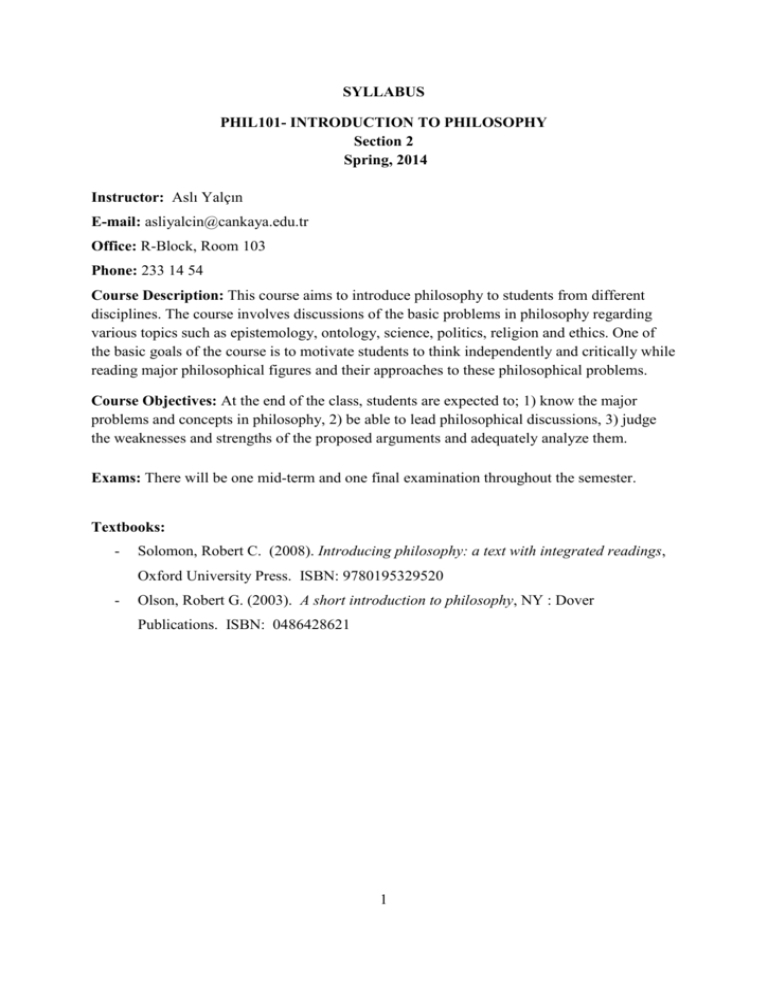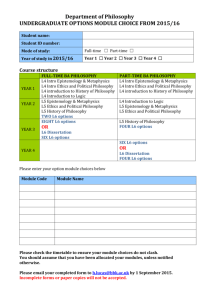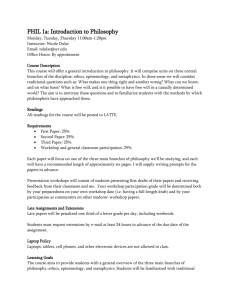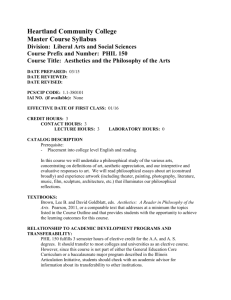SYLLABUS PHIL101- INTRODUCTION TO PHILOSOPHY Section 2
advertisement

SYLLABUS PHIL101- INTRODUCTION TO PHILOSOPHY Section 2 Spring, 2014 Instructor: Aslı Yalçın E-mail: asliyalcin@cankaya.edu.tr Office: R-Block, Room 103 Phone: 233 14 54 Course Description: This course aims to introduce philosophy to students from different disciplines. The course involves discussions of the basic problems in philosophy regarding various topics such as epistemology, ontology, science, politics, religion and ethics. One of the basic goals of the course is to motivate students to think independently and critically while reading major philosophical figures and their approaches to these philosophical problems. Course Objectives: At the end of the class, students are expected to; 1) know the major problems and concepts in philosophy, 2) be able to lead philosophical discussions, 3) judge the weaknesses and strengths of the proposed arguments and adequately analyze them. Exams: There will be one mid-term and one final examination throughout the semester. Textbooks: - Solomon, Robert C. (2008). Introducing philosophy: a text with integrated readings, Oxford University Press. ISBN: 9780195329520 - Olson, Robert G. (2003). A short introduction to philosophy, NY : Dover Publications. ISBN: 0486428621 1 Course Outline Date Topic(s) February,12 Introduction February,13 What is philosophy? What are the major problems of philosophy? February, 19 Problems of Epistemology: Nature of Knowledge, The Problem of Truth, Source of Knowledge, Scope of Knowledge, Rationalist and Empiricist approaches to knowledge February,20 Problem of External World –Theories of Epistemology: Rene Descartes February, 26 Problem of External World –Theories of Epistemology: Rene Descartes February, 27 Problem of External World –Theories of Epistemology: John Locke March, 5 Problem of External World –Theories of Epistemology: John Locke March,6 Problem of External World – Theories of Epistemology: David Hume March,12 Problem of External World – Theories of Epistemology: David Hume March,13 Problem of External World- Immanuel Kant (Ontology & Epistemology) March,19 Problem of External World- Immanuel Kant (Ontology & Epistemology) March,20 Problem of External World- Immanuel Kant (Ontology & Epistemology March, 26 Problem of External World- George Berkeley (Ontology & Epistemology) March, 27 Problem of External World- George Berkeley (Ontology & Epistemology) April, 2 Problem of God (Philosophy of Religion) – Proofs regarding God’s existence: Ontological argument, cosmological argument, first-cause argument, arguments from miracles April, 3 Problem of God (Philosophy of Religion) – Arguments against God’s existence, the problem of evil April, 9 Midterm I 2 April, 10 Problems of Morality (Ethics) – Deontological and Utilitarian Theories of Morality April, 16 Problems of Morality (Ethics) – Deontological and Utilitarian Theories of Morality April, 17 Problems of Morality (Ethics) – Meta-ethics, moral relativity *April, 23 National Sovereignty and Children's Day-No course April, 24 Problems of Society and Politics (Social & Political Philosophy) - Ideal state (society), theories of justice April, 30 Problems of Society and Politics (Social & Political Philosophy) – Theories of social contract and political systems *May, 1 Labor and Solidarity Day- No course May, 5 Problems of Society and Politics (Social & Political Philosophy) – Theories of social contract and political systems May,6 Problems of Science (Philosophy of Science)- Scientific method, positivism and scientific realism, New approach; Kuhn May,12 Problems of Science (Philosophy of Science)- New approach, Lakatosh May,13 Problems of Science (Philosophy of Science)- Social Constructivism May, 19 Problems Regarding Body & Mind (Philosophy of Mind) May, 20 Problems Regarding Body & Mind (Philosophy of Mind) **Special Note: Plagiarism and cheating are serious offenses. Therefore, any attempts may be punished by failure on an exam, paper, or projects; failure in the course; and / or expulsion from the university. 3








